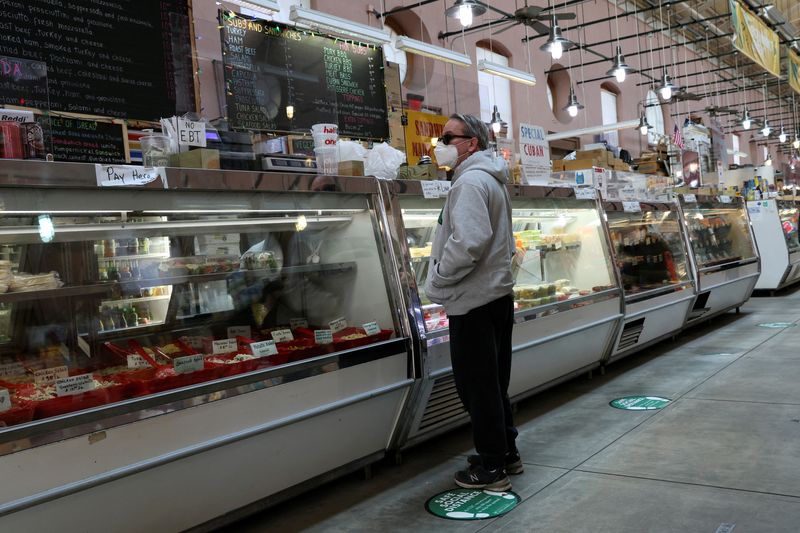By Lucia Mutikani
WASHINGTON (Reuters) - U.S. consumer sentiment fell more than expected in early March as gasoline prices surged to a record high in the aftermath of Russia's war against Ukraine, boosting one-year inflation expectations to the highest level since 1981.
The third straight monthly decline reported by the University of Michigan on Friday pushed consumer sentiment to its lowest level in nearly 11 years. It said 24% of respondents "spontaneously mentioned the Ukraine invasion in response to questions about the economic outlook."
The University of Michigan's preliminary consumer sentiment index dropped to 59.7 in the first half of this month, the lowest reading since September 2011, from a final reading of 62.8 in February. Economists polled by Reuters had forecast the index falling to 61.4.
The survey places more emphasis on gasoline prices and the stock market. The Conference Board's consumer confidence index, which puts more weight on the labor market, remains well above its COVID-19 pandemic lows.
Economists said the continued slump in the University of Michigan's sentiment index was overdone relative to fundamentals and they expected the economy to continue growing.
The labor market is churning out jobs at a rapid pace, the unemployment rate is at a two-year low, wages are rising and there were 11.3 million job openings at the end of January. Consumers have amassed more than $2 trillion in excess savings.
"The relationship between spending and sentiment is loose, particularly in the short-run, and real disposable income growth and other determinants of household budgets and finances are more important," said Scott Hoyt, a senior economist at Moody's (NYSE:MCO) Analytics in West Chester, Pennsylvania.
"Support will also be coming from plentiful jobs and abundant available cash and credit for many. The volatility of income expectations may suggest consumers are struggling to understand how labor market tightness and inflation will impact their budgets."
Graphic: Umich vs spending: https://graphics.reuters.com/USA-STOCKS/gdvzybgjjpw/umichwords.png
Following Russia's invasion of Ukraine on Feb. 24, crude oil prices jumped more than 30%, with global benchmark Brent hitting a 2008 high at $139 a barrel, before retreating to trade around $110 a barrel on Friday.
U.S. gasoline prices are averaging a record $4.331 per gallon compared with $3.48 a month ago, AAA data showed.
Further increases are likely after President Joe Biden on Tuesday banned imports of Russian oil into the United States, as part of a wide-ranging tough sanctions against Moscow.
The University of Michigan survey's gauge of current economic conditions slipped to a reading of 67.8 from 68.2 in February. Its measure of consumer expectations declined to 54.4 from 59.4 in February.
Graphic: UMich: https://graphics.reuters.com/USA-STOCKS/zgpomzdyepd/umich.png
The survey's one-year inflation expectations jumped to 5.4%, the highest since 1981, from 4.9% in February. But its five-year inflation expectations held steady at 3.0% for a second straight month, something likely to be welcomed by Federal Reserve officials.
The U.S. central bank is expected to start raising interest rates next Wednesday. Economists expect as many as seven rate hikes this year.
Graphic: Umich inflation expectations: https://graphics.reuters.com/USA-STOCKS/jnvwebokrvw/umichinflation.png

"The stability of the longer-term inflation expectations measure is a slightly more encouraging sign, providing further tentative evidence that underlying inflationary pressures are starting to level off," said Andrew Hunter, a senior economist at Capital Economics.
The government reported on Thursday that consumer prices recorded their largest annual increase in 40 years in February.